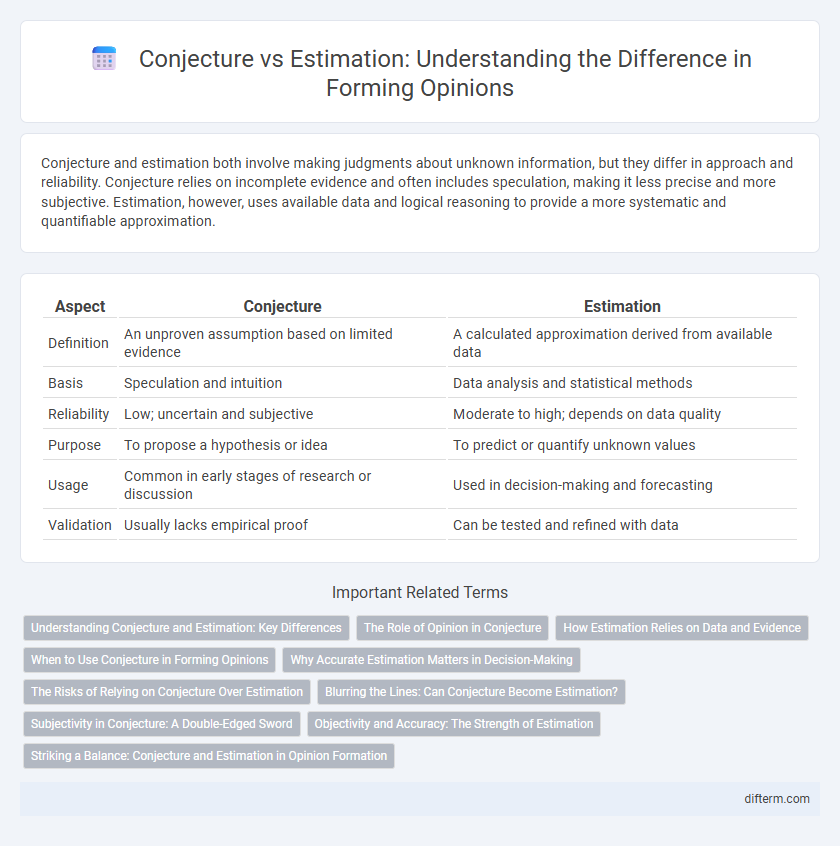Conjecture and estimation both involve making judgments about unknown information, but they differ in approach and reliability. Conjecture relies on incomplete evidence and often includes speculation, making it less precise and more subjective. Estimation, however, uses available data and logical reasoning to provide a more systematic and quantifiable approximation.
Table of Comparison
| Aspect | Conjecture | Estimation |
|---|---|---|
| Definition | An unproven assumption based on limited evidence | A calculated approximation derived from available data |
| Basis | Speculation and intuition | Data analysis and statistical methods |
| Reliability | Low; uncertain and subjective | Moderate to high; depends on data quality |
| Purpose | To propose a hypothesis or idea | To predict or quantify unknown values |
| Usage | Common in early stages of research or discussion | Used in decision-making and forecasting |
| Validation | Usually lacks empirical proof | Can be tested and refined with data |
Understanding Conjecture and Estimation: Key Differences
Conjecture relies on incomplete information and intuition, often lacking empirical evidence, making it speculative by nature. Estimation employs available data and statistical methods to produce a quantified approximation, enhancing reliability and accuracy. Recognizing these distinctions is crucial for informed decision-making and minimizing errors in analysis.
The Role of Opinion in Conjecture
Opinion plays a crucial role in conjecture by providing the subjective foundation upon which hypotheses are formed without complete evidence. Unlike estimation, which relies on numerical data and probabilistic reasoning, conjecture often depends on interpretative judgment and personal belief to propose possible explanations or outcomes. This subjective input allows for creativity and innovation but requires cautious evaluation to distinguish speculation from informed prediction.
How Estimation Relies on Data and Evidence
Estimation depends heavily on concrete data and empirical evidence to produce reliable results. By analyzing historical trends and measurable variables, estimations reduce uncertainty and provide a structured approach to predicting outcomes. This reliance on verified information distinguishes estimation from mere conjecture, which is often speculative and lacks factual support.
When to Use Conjecture in Forming Opinions
Conjecture should be used in forming opinions when empirical data is scarce or inconclusive, allowing for hypothesis generation and creative thinking. It is appropriate in exploratory phases where speculation drives new insights or prompts further investigation. Utilizing conjecture effectively requires balancing imaginative inference with the readiness to revise opinions as new evidence emerges.
Why Accurate Estimation Matters in Decision-Making
Accurate estimation directly influences the quality of decisions by providing reliable projections that mitigate risks and optimize resource allocation. Conjecture, based on assumptions without sufficient evidence, often leads to flawed conclusions and inefficient strategies. Precise estimation enhances confidence in decision-making processes, enabling organizations to set realistic goals and improve overall outcomes.
The Risks of Relying on Conjecture Over Estimation
Relying on conjecture instead of estimation significantly increases the risk of inaccurate decision-making due to a lack of evidence-based analysis. Unlike estimations, which are grounded in data and statistical methods, conjectures are speculative and can lead to flawed assumptions with costly consequences. Organizations that prioritize conjecture over estimation expose themselves to higher uncertainty and potential financial losses.
Blurring the Lines: Can Conjecture Become Estimation?
Conjecture often relies on intuition or incomplete information, while estimation involves systematic analysis and quantifiable data. The distinction blurs when educated guesses incorporate empirical evidence, gradually transforming conjecture into a more reliable estimation. This convergence highlights the evolving nature of knowledge assessment in uncertain contexts.
Subjectivity in Conjecture: A Double-Edged Sword
Conjecture relies heavily on subjective interpretation, making it a double-edged sword in analysis by introducing both creative insight and potential bias. Unlike estimation, which is grounded in data and quantitative methods, conjecture's subjectivity can lead to overconfidence or flawed conclusions when personal beliefs overshadow empirical evidence. Understanding this balance is crucial for evaluating the reliability and validity of conjectural assertions.
Objectivity and Accuracy: The Strength of Estimation
Estimation offers a more objective and accurate approach compared to conjecture by relying on measurable data and systematic analysis rather than mere speculation. The strength of estimation lies in its ability to minimize bias and provide quantifiable insights that support informed decision-making. Accurate estimations enhance reliability, making them indispensable in fields requiring precise forecasts and evaluations.
Striking a Balance: Conjecture and Estimation in Opinion Formation
Striking a balance between conjecture and estimation is crucial in opinion formation to ensure perspectives remain grounded yet open to new ideas. Conjecture sparks creativity and speculative insight, while estimation anchors opinions in available evidence and probabilistic reasoning. Integrating both approaches enhances critical thinking, promoting well-rounded and adaptive viewpoints.
conjecture vs estimation Infographic

 difterm.com
difterm.com